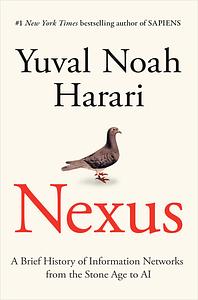Take a photo of a barcode or cover
1.03k reviews for:
Nexus: A Brief History of Information Networks from the Stone Age to AI
Yuval Noah Harari
1.03k reviews for:
Nexus: A Brief History of Information Networks from the Stone Age to AI
Yuval Noah Harari
3.5/5
This could’ve been shorter. The stories and the research were great, but it was too much for the very simple main point — history has shown information can make or break us, and AI has led us into a new age of information — so let’s regulate it. Got it. You can spare me from the 100000 points to prove the low key obvious point. However, there were some standout historical stories, and I love that shit. So still worth it for the few gems scattered throughout.
This could’ve been shorter. The stories and the research were great, but it was too much for the very simple main point — history has shown information can make or break us, and AI has led us into a new age of information — so let’s regulate it. Got it. You can spare me from the 100000 points to prove the low key obvious point. However, there were some standout historical stories, and I love that shit. So still worth it for the few gems scattered throughout.
informative
reflective
slow-paced
informative
reflective
slow-paced
I'll be honest, I'm very confused about the reviews suggesting that this is some sort of god-tiered level brilliance. I think if you already gravitate towards anthropology, philosophy, and their intersection with technology, you'll find that Harari doesn't introduce anything new or revolutionary. This isn't to say that I disagree with Harari's writing- I actually think he is more or less correct on many things, although I think he doesn't always use the best examples to illustrate or support a concept. Rather, another reviewer described his work as "a mile wide and an inch deep" and I would tend to agree.
My chief complaint with this book is that there is no connecting thread. If I was told that Harari had a bunch of ideas to throw on a page but was at a loss as to how to connect them together, I would tell you that... yea, that tracks.
Overall this book is a pass. I don't think it was a waste of time to read, but there are so many better options out there. I'll also be passing on future novels by this author, as I've now been let down twice.
My chief complaint with this book is that there is no connecting thread. If I was told that Harari had a bunch of ideas to throw on a page but was at a loss as to how to connect them together, I would tell you that... yea, that tracks.
Overall this book is a pass. I don't think it was a waste of time to read, but there are so many better options out there. I'll also be passing on future novels by this author, as I've now been let down twice.
Some really interesting and important topics are discussed here, found the first half of the book around the evolution of information networks and how to define information particularly fascinating. The development of the relationships between totalitarianism and democracy with information networks, cited in Ancient Rome or Stalin's Russia. This discussion of the naive view of information relating to witch hunting in the 13th to 15th century as well brilliantly exemplified this idea of more information creating corrupted 'inter-subjective realities'. I want to give this book 5 stars and think it's a brilliant touch point for people less familiar with Yuval's other books, it's certainly more pressing!
Having read his other books and others surrounding AI or geopolitics, I found that there wasn't as much 'new' information as I'd hoped for and felt like significant portions of parts were repeating things from his other books to a point that was sometimes a little tedious. I think what lies with the problem is that he is a highly articulate writer and creates highly engaging stories when relying on his strengths (early history), and his experience and knowledge in the AI field have been largely gleaned (he states at the end of the book) from the privileged position he was put in to take a look at the discussions happening behind closed doors after completely 'Homo Deus' in 2016. What this means is that the narrative strings in the first half of the book overshadow the capacity for storytelling in the second half as he doesn't have the same expertise.
This is still an incredible book and I think if they had trimmed the fat in the editing a little, and taken off 50 or so pages, this would've been 5 stars for me, I also think I hold him to a higher standard due to his past works. 8.5/10 (an incredibly important read!)
Having read his other books and others surrounding AI or geopolitics, I found that there wasn't as much 'new' information as I'd hoped for and felt like significant portions of parts were repeating things from his other books to a point that was sometimes a little tedious. I think what lies with the problem is that he is a highly articulate writer and creates highly engaging stories when relying on his strengths (early history), and his experience and knowledge in the AI field have been largely gleaned (he states at the end of the book) from the privileged position he was put in to take a look at the discussions happening behind closed doors after completely 'Homo Deus' in 2016. What this means is that the narrative strings in the first half of the book overshadow the capacity for storytelling in the second half as he doesn't have the same expertise.
This is still an incredible book and I think if they had trimmed the fat in the editing a little, and taken off 50 or so pages, this would've been 5 stars for me, I also think I hold him to a higher standard due to his past works. 8.5/10 (an incredibly important read!)
hopeful
informative
inspiring
medium-paced
hopeful
informative
reflective
medium-paced
Given the amount of times Harari wrote “the naive view of information …” I’m shocked he didn’t end up naming the book that instead of Nexus. Regardless, I was kept interested throughout; reading it didn’t make me feel like I was doing homework or anything drab like that. Turns out information networks are interesting! (At least when elucidated by a skilled author.)
challenging
dark
informative
sad
medium-paced
I think the mistake is calling this “The AI Book”, because it’s not. It is however, a good exploration of history, philosophy and the dangers of humanity that AI has the opportunity to exploit.
Nexus by Yuval Noah Harari is a thought-provoking and deeply engaging exploration of the future of humanity in an increasingly connected world. Harari’s ability to distill complex ideas into clear, compelling narratives makes this book a standout. He weaves together history, technology, and philosophy with impressive clarity. The book challenges readers to reflect on the ethical and societal implications of rapid technological advancements. It’s both a cautionary tale and a call for mindful innovation. Harari’s insights are eye-opening, often unsettling, but always deeply relevant. He poses tough questions without offering easy answers. This book isn’t just informative—it’s transformative. A must-read for anyone curious about where we’re headed.
informative
reflective
medium-paced
The first half is utter Faff. The second half makes some good points about the future of A.I. I would not recommend
informative
reflective




